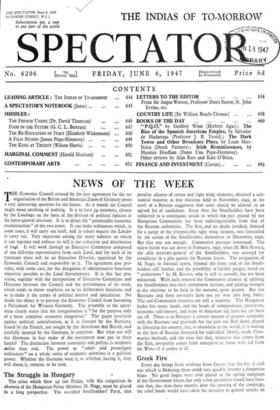The Struggle in Hungary
The crisis which blew up last Friday, with the resignation in absentia of the Hungarian Prime Minister, M. Nagy, must be placed in a long perspective. The so-called Smallholders' Party, that peculiar alliance of centre and right wing elements, obtained a sub- stantial majority at free elections held in November, 1945, in the teeth of a Russian suggestion that seats should be allotted to an agreed list of candidates. Since then the Smallholders have been subjected to a continuous attack in which the part played by the Hungarian Communists has been indistinguishable from that of the Russian authorities. The first, and no doubt justified, demand for a purge of the irresponsible right wing element, was forestalled by the action of the Smallholders themselves in December, 1946. But that was not enough. Communist pressure continued. The tallest thistle was cut down in February, 1947, when M. Bela Kovacs, the able secretary-general of the Smallholders, was arrested for complicity in a plot against the Russian forces. The resignation of M. Nagy, to forestall arrest, thinned the front rank of the Small- holders still further, and the possibility of further purges, based on " confessions " by M. Kovacs, who is still in custody, has not been exhausted. With each removal the Communist chances of splitting the Smallholders into their component factions, and gaining strength at the elections to be held in the autumn, grow greater. But the Russians and their assistants have not yet won this long battle. The anti-Communist elements are still a majority. The Hungarian hydra has many heads, and the heads of independence, patriotism, economic self-interest, and hope of American aid, have not yet been cut off. There is in Hungary a certain amount of genuine sympathy with the Russians and gratitude for the part the Red Army played in liberating the country, but, as elsewhere in the world, it is waning in the face of Russian disregard for individual liberty, crude Com- munist methods, and the clear fact that, whatever else comes from the East, prosperity comes from enterprise at home with aid from the West—if it comes at all.


































